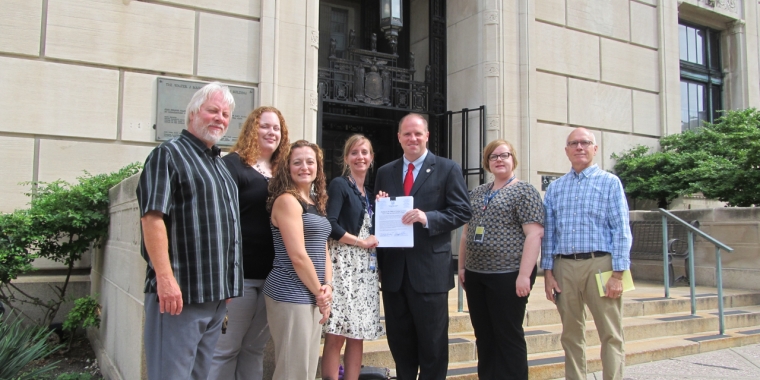
Preserve Our Waterways: Kennedy Stands with Local Environmental Leaders to Demand Ban on Harmful, Commonly-Used Chemical Found in Cleaning and Personal Care Products
October 20, 2015
-
ISSUE:
- Environment
- Great Lakes
- Water

Aquatic Ecosystems Threatened by Triclosan; Toxic Pollutant Increasingly Found in Great Lakes Waterways
Wastewater Treatment Plants Unable to Completely Filter Harmful Compound Frequently Found in Antibacterial Soaps, Shampoos and Detergents
Kennedy: The Products That Keep Us and Our Homes Clean Shouldn’t Be Making Our Waterways Dirtier
BUFFALO, N.Y. – Senator Tim Kennedy stood with local environmental advocates today to call for a ban on the use of triclosan in cleaning and personal products, a chemical increasingly found in Great Lakes waterways that can be toxic to aquatic life and algae. Kennedy has introduced Senate legislation, S.6070, which would prohibit the sale of any of these products that contain triclosan, or chemical derivatives of it. Triclosan was first added to commercial liquid hand soap in 1987, but is now found in a variety of personal care products, including shampoo, dishwashing liquid, laundry detergent and deodorant. When washed down the drain, triclosan enters wastewater treatment plants.
Unfortunately, many treatment plants are unable to completely remove the chemical from the water. As a result, the remnants of triclosan are then transferred to Great Lakes waterways, and can subsequently affect aquatic ecosystems.
“The Great Lakes represent the largest supply of freshwater in the world, which for Western New York is a great opportunity, but also a great responsibility. As we continue to experience a revitalization centered around our waterfront, we must do everything in our power to keep our lakes and rivers free of harmful chemicals and pollutants, so that our children and grandchildren can enjoy the abundance of wildlife the Great Lakes have to offer," said Senator Tim Kennedy. “When we return to Albany in January, this bill and a ban on products containing dangerous microbeads need to be at the top of the priority list. I thank the environmental leaders who have stood beside us in our advocacy, and I urge my colleagues to recognize the immediate impact of this legislation, because we simply cannot continue to put our ecosystems and our wildlife at risk.”
"Western New York communities rely on the Great Lakes and Niagara River for drinking water, so any product that can break down into multiple dioxins, bioaccumulate, and be a suspected endocrine disruptor is a cause for concern,” said Jill Jedlicka, executive director of Buffalo Niagara Riverkeeper. "A significant body of scientific research is also revealing that people are unintentionally contributing to the development of resistant bacteria through the production of unnecessary and redundant personal care products like triclosan. We thank Senator Kennedy for his proactive effort to introduce legislation intended to protect both human health and our Great Lakes."
"Every time we wash our hands or brush our teeth, we shouldn't be polluting the Great Lakes with toxic triclosan," said Brian Smith, Associate Executive Director at Citizens Campaign for the Environment (CCE). "When it comes to protecting our Great Lakes, an ounce of prevention is worth a pound of cure. Citizens Campaign for the Environment commends Senator Kennedy for proactively working to address the threat of triclosan, before more damage is done.”
As the home to over 700 miles of Great Lakes waterfront, and with over 40% and 33 counties located in the Great Lakes Basin watershed, environmental choices in New York State can have a significant impact on the health of the Great Lakes. According to the National Resources Defense Council, studies have shown that triclosan can interfere with the development of tadpoles and earthworms, and can have a toxic effect on photosynthesis in algae, threatening an already fragile and damaged ecosystem. Alarmingly, a study by the Great Lakes Alliance found that triclosan is one of the leading compound contaminants found in the Great Lakes. In addition to recreational boating and commercial shipping, Lake Erie is also host to one of the Great Lakes’ largest commercial fisheries, providing millions of pounds of walleye and yellow perch for the American and Canadian markets.
While the Food and Drug Administration (FDA) says triclosan is not currently known to be hazardous to humans, scientific studies have shown that it may be harmful to animals, which have prompted the FDA to further study the chemical. According to the Mayo Clinic, these studies have raised questions about whether triclosan may alter hormone regulation in animals, contribute to the creation of antibiotic-resistant germs and be detrimental to immune systems. Many personal care product companies, such as Johnson and Johnson, have already vowed to discontinue the use of triclosan in their cleaning products. Kennedy's bill, which would take effect 18 months after passage, would mandate these changes for all companies.
###
related legislation
Share this Article or Press Release
Newsroom
Go to Newsroom

